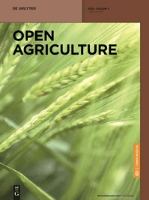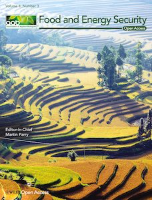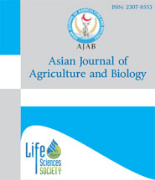
Revista Investigaciones Altoandinas-Journal of High Andean Research
Scope & Guideline
Bridging research and practice in the heart of the Andes.
Introduction
Aims and Scopes
- Sustainable Agriculture and Food Security:
Research focusing on agricultural practices, crop yield improvement, and food security in the high Andean region, including studies on traditional crops like quinoa and their nutritional properties. - Environmental Impact and Biodiversity:
Studies assessing the impact of climate change, mining, and agricultural practices on biodiversity and ecosystem health, highlighting the unique challenges faced by the Andean ecosystems. - Resource Management and Circular Economy:
Papers addressing innovative approaches to resource management, including waste valorization and the sustainable use of natural resources, particularly in mining and agriculture. - Socioeconomic Studies:
Research exploring the socioeconomic factors affecting communities in the Andean region, including governance of natural resources, economic impacts of climate change, and community-based agricultural practices. - Technological Innovations in Agriculture:
Investigations into the application of new technologies and methodologies in agricultural practices, including precision agriculture and the use of remote sensing for environmental monitoring.
Trending and Emerging
- Climate Change Adaptation Strategies:
There is a growing emphasis on research related to climate change impacts and adaptation strategies, particularly concerning agricultural resilience and sustainable practices in the face of environmental changes. - Circular Economy Initiatives:
Recent trends show an increase in studies focusing on the circular economy, specifically the valorization of waste materials and sustainable resource management practices in agriculture and mining. - Nutritional Enhancement of Indigenous Crops:
Research dedicated to enhancing the nutritional profiles of traditional Andean crops, like quinoa, has gained traction, reflecting a heightened interest in food security and health benefits associated with these crops. - Technological Integration in Agriculture:
Emerging studies are increasingly exploring the integration of technology in agriculture, including the use of remote sensing tools and data analytics to improve agricultural productivity and environmental monitoring. - Socioeconomic Impact Studies:
There is a notable trend towards examining the socioeconomic impacts of agricultural practices and climate change on local communities, emphasizing the need for sustainable development policies.
Declining or Waning
- Traditional Agricultural Practices:
Research focusing on traditional farming methods seems to be declining, possibly due to a shift towards modern agricultural technologies and practices that promise higher yields and efficiency. - Aquaculture Studies:
Although aquaculture has been a topic of interest, there is a noticeable decrease in publications related to fish farming and aquatic species management, suggesting a waning interest or saturation of the topic. - Human Health and Nutrition Studies:
Papers specifically addressing the intersection of human health and traditional Andean foods are becoming less frequent, indicating a potential shift towards broader agricultural and environmental themes.
Similar Journals

SPANISH JOURNAL OF AGRICULTURAL RESEARCH
Cultivating Knowledge for Sustainable AgricultureThe Spanish Journal of Agricultural Research (ISSN: 1695-971X, E-ISSN: 2171-9292), published by the prestigious Consejo Superior Investigaciones Cientificas (CSIC), serves as a vital resource for those engaged in the fields of agronomy and crop science. Established as an Open Access journal since 2003, it aims to foster the dissemination of innovative research and practical applications related to agricultural practices and sustainability. With its Q3 category in Agronomy and Crop Science and a Scopus ranking of #224 out of 406, the journal provides an accessible platform for scholars to share valuable findings that enhance agricultural productivity and environmental stewardship. Covering research from 2006 to 2024, this journal continues to be instrumental for researchers, professionals, and students eager to remain at the forefront of agricultural science advancements.

Open Agriculture
Connecting Researchers to Transform Agricultural PracticesOpen Agriculture, published by DE GRUYTER POLAND SP Z O O, is an innovative open-access journal dedicated to advancing research in the Agricultural and Biological Sciences. Since its inception in 2016, this journal has been committed to disseminating knowledge and facilitating collaboration among researchers, professionals, and enthusiasts in the agricultural sector. With an impressive Q2 ranking in the Agricultural and Biological Sciences category, it holds a prestigious position, ranking #65 out of 221 in its field, placing it in the 70th percentile. Open Agriculture offers a platform for high-quality research across a diverse range of topics, ensuring that crucial findings are readily accessible to the global scientific community. The journal continues to uphold its mission of promoting sustainable agricultural practices and innovations that address contemporary challenges in food security and environmental sustainability. With its strong commitment to open access principles, researchers and students alike can easily engage with cutting-edge research and contribute to the vibrant discourse surrounding modern agriculture.

Journal of Agriculture and Environment for International Development
Cultivating Knowledge for International DevelopmentJournal of Agriculture and Environment for International Development, published by AGENZIA ITALIANA COOPERAZIONE SVILUPPO-ITALIAN DEV COOP AGENCY, is a vital platform advancing research at the intersection of agricultural practices, environmental sustainability, and international development. Since its inception, this Open Access journal has aimed to disseminate knowledge and innovative strategies that address global challenges in the agri-environment sector. With ISSN 2240-2802, this esteemed publication is situated in Italy and has maintained an unwavering commitment to accessibility since 2011, encouraging widespread engagement amongst researchers and practitioners. Although currently ranked in the Q4 quartile across various categories including Agricultural and Biological Sciences and Environmental Science, the journal is dedicated to covering crucial topics that contribute to sustainable development, thus serving as an invaluable resource for scholars and policymakers alike. The convergence years from 2016 to 2024 reflect the journal's adaptive approach to evolving global trends, ensuring its relevance in a rapidly changing academic landscape.

Economia Agraria y Recursos Naturales
Pioneering Discoveries in Agricultural Economics and Natural ResourcesEconomia Agraria y Recursos Naturales, published by UNIV POLITECNICA VALENCIA, EDITORIAL UPV, is a prominent open-access journal that has been serving the fields of agricultural and biological sciences, environmental science, and geography since 2001. With an ISSN of 1578-0732 and an E-ISSN of 2174-7350, this journal is dedicated to publishing high-quality research that contributes to the sustainable management of natural resources and agricultural practices. The journal invites scholars, practitioners, and students to explore and share innovative findings that address pressing environmental challenges. While currently categorized in the lower quartiles (Q4) for various disciplines in 2023, its open-access model ensures wide dissemination and visibility for authors and their work, aligning with the growing trend towards accessibility in academic publishing. Positioned in Spain, Economia Agraria y Recursos Naturales is a valuable resource for those seeking to engage with the intersection of agriculture, environmental studies, and policy planning within a global context.

Scientific Papers-Series Management Economic Engineering in Agriculture and Rural Development
Empowering Innovation in Agriculture and Rural DevelopmentScientific Papers-Series Management Economic Engineering in Agriculture and Rural Development is a premier open access journal dedicated to advancing the field of agricultural and rural development management. Published by the University of Agronomic Sciences and Veterinary Medicine Bucharest, this journal has been a valuable resource for researchers, practitioners, and students since its inception in 2009. With a focus on the integration of economic engineering principles into agricultural practices, the journal aims to provide innovative solutions and insights that address contemporary challenges in rural development. While the journal's H-index and specific Scopus rankings are not listed, its open access format ensures that cutting-edge research is readily available to a global audience, facilitating engagement and collaboration across disciplines. Located in the heart of Romania, the journal serves as a critical platform for disseminating impactful research and fostering dialogue in the ever-evolving landscape of agriculture and rural development.

Food and Energy Security
Advancing Sustainable Solutions for Global Food and Energy ChallengesFood and Energy Security, an esteemed journal published by WILEY, is dedicated to advancing the fields of food science, agriculture, and renewable energy. Since its inception in 2012, this open-access journal has provided a platform for groundbreaking research and innovative practices that address global challenges related to food production and energy sustainability. With an impressive impact factor reflected in its Q1 quartile rankings across notable categories such as Agronomy and Crop Science and Food Science, this journal is instrumental for researchers and practitioners alike who are focused on enhancing food security and promoting sustainable energy solutions. The journal's scope encompasses multidisciplinary approaches and encourages submissions that explore the intersection of food systems and energy dynamics, ensuring relevance in the evolving landscape of environmental science and policy. By offering open access to its publications, Food and Energy Security commits to making vital research accessible, fostering informed dialogue and collaboration among scholars, policymakers, and the agrifood industry worldwide.

Studies in Agricultural Economics
Pioneering Research for Rural Development SolutionsStudies in Agricultural Economics is a premier journal published by AGRARGAZDASAGI KUTATO & INFORMATIKAI INTEZET in Hungary, focusing on innovative research in the interdisciplinary fields of agricultural, biological, and economic sciences. Since becoming an Open Access journal in 1997, it has aimed to enhance the visibility of agricultural economics scholarship while promoting global engagement among researchers, practitioners, and policymakers. With its robust Q2 and Q3 rankings across varied categories including Development and Geography, this journal serves as a significant platform for disseminating cutting-edge studies that address crucial issues in agriculture and rural development. The journal's continuous publication since 2011 until 2024 exemplifies its commitment to providing timely insights into evolving agricultural challenges. With a strong Scopus ranking across multiple domains, particularly in the social sciences and agricultural sectors, it stands as a vital resource for anyone looking to advance knowledge and practice in these critical areas.

AIMS Agriculture and Food
Bridging disciplines for a secure food future.AIMS Agriculture and Food is a leading open access journal published by the American Institute of Mathematical Sciences (AIMS), focused on the critical intersections of agricultural and food sciences. Since its inception in 2016, this journal has provided a vital platform for disseminating innovative research and advancements in the fields of agricultural and biological sciences and food science. With impressive Scopus rankings, including a Q2 categorization in 2023 for both Agricultural and Biological Sciences (miscellaneous) and Food Science, AIMS Agriculture and Food is recognized for its significant contributions to the academic community. The journal aims to foster interdisciplinary dialogue by welcoming submissions that tackle contemporary challenges, promote sustainable practices, and enhance food security. Researchers, professionals, and students will find this journal an invaluable resource, offering open access to high-quality, peer-reviewed articles that are essential for informed decision-making in agriculture and food industries.

Asian Journal of Agriculture and Biology
Fostering knowledge in agriculture and biology for a better tomorrow.Welcome to the Asian Journal of Agriculture and Biology, a premier open access journal published by LIFE SCIENCES SOC PAKISTAN, dedicated to advancing research in the fields of agricultural and biological sciences. Since its inception in 2013, this journal has provided a vital platform for scholars and practitioners to disseminate novel findings and innovative methodologies that contribute to the betterment of agricultural practices and biological research. With an impressive H-Index and ranked in the Q3 category across multiple disciplines including Agricultural and Biological Sciences, Biochemistry, Genetics, and Molecular Biology, as well as Medicine, the journal showcases high-quality research that influences both academic and practical applications globally. The journal is indexed in Scopus, reinforcing its commitment to high academic standards and providing researchers with efficient access to significant knowledge. Based in Pakistan, the Asian Journal of Agriculture and Biology is your gateway to staying abreast of the latest trends and discoveries that support sustainable development and health sciences.

Advances in Agriculture
Driving Change in Agriculture, One Study at a TimeAdvances in Agriculture is a prominent Open Access journal dedicated to the dissemination of high-quality research in the fields of agriculture, agronomy, animal science, food science, and soil science. Published by HINDAWI LTD from the United Kingdom, this journal has made significant strides since its inception in 2014, contributing to the advancement of agricultural knowledge and practices. With an impressive impact factor reflected in its tiered quartile rankings, notably Q2 in Agricultural and Biological Sciences (miscellaneous), Agronomy and Crop Science, and Animal Science and Zoology, it serves as a key platform for innovative research and applied science. The journal aims to provide researchers, professionals, and students with rich access to groundbreaking studies that can help shape sustainable agricultural practices and policies. Emphasizing a global audience, Advances in Agriculture promotes an inclusive dialogue among scholars to tackle contemporary challenges in agriculture, enhancing food security and environmental stewardship worldwide.